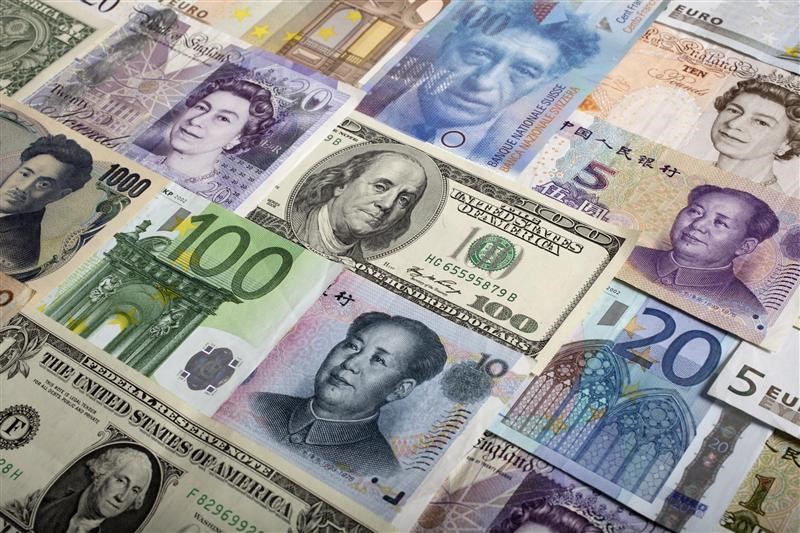ABUJA, Nov 30 (Reuters) - Nigeria hopes to attract more
remittances from its diaspora to boost foreign currency
liquidity after the central bank issued a circular on Monday
lifting rules that had restricted inflows.
Rising dollar demand has been putting pressure on the naira.
Importers with obligations have scrambled for hard currency,
while providers of foreign exchange, such as offshore investors,
have exited after COVID-19 triggered an oil price crash.
The bank said diaspora remittances would be paid in cash in
U.S. dollars or into a domiciliary (foreign-currency) account at
market rates. In the past, remittances could be paid in naira
and the central bank had restricted domiciliary account usage.
In the circular, the bank sought to lure more remittances, a
major source of dollar inflow after oil. The bank said the
changes were needed to deepen the currency market and provide
more liquidity.
Nigeria is the world's fifth-biggest destination for
international remittances, with 5 million Nigerians living
abroad sending money back to relatives, according to Western
Union. PricewaterhouseCoopers estimated that diaspora flows into
Nigeria totalled $23.63 billion in 2018, representing 6.1% of
GDP.
The naira hit 500 to the dollar on the black market on
Monday to fall to a 3-1/2-year low as dollar scarcity worsened,
widening the gap with the official market. The central bank weakened the naira by 1.5% to 390 per
dollar for exchange bureaux, closer to the over-the-counter spot
market, quoted by investors and importers, to ease pressure on
the currency.
- English (USA)
- English (UK)
- English (India)
- English (Canada)
- English (Australia)
- English (South Africa)
- English (Philippines)
- Deutsch
- Español (España)
- Español (México)
- Français
- Italiano
- Nederlands
- Português (Portugal)
- Polski
- Português (Brasil)
- Русский
- Türkçe
- العربية
- Ελληνικά
- Svenska
- Suomi
- עברית
- 日本語
- 한국어
- 简体中文
- 繁體中文
- Bahasa Indonesia
- Bahasa Melayu
- ไทย
- Tiếng Việt
- हिंदी
Nigeria eases rules on diaspora remittances to boost FX liquidity

Latest comments
Install Our App
Risk Disclosure: Trading in financial instruments and/or cryptocurrencies involves high risks including the risk of losing some, or all, of your investment amount, and may not be suitable for all investors. Prices of cryptocurrencies are extremely volatile and may be affected by external factors such as financial, regulatory or political events. Trading on margin increases the financial risks.
Before deciding to trade in financial instrument or cryptocurrencies you should be fully informed of the risks and costs associated with trading the financial markets, carefully consider your investment objectives, level of experience, and risk appetite, and seek professional advice where needed.
Fusion Media would like to remind you that the data contained in this website is not necessarily real-time nor accurate. The data and prices on the website are not necessarily provided by any market or exchange, but may be provided by market makers, and so prices may not be accurate and may differ from the actual price at any given market, meaning prices are indicative and not appropriate for trading purposes. Fusion Media and any provider of the data contained in this website will not accept liability for any loss or damage as a result of your trading, or your reliance on the information contained within this website.
It is prohibited to use, store, reproduce, display, modify, transmit or distribute the data contained in this website without the explicit prior written permission of Fusion Media and/or the data provider. All intellectual property rights are reserved by the providers and/or the exchange providing the data contained in this website.
Fusion Media may be compensated by the advertisers that appear on the website, based on your interaction with the advertisements or advertisers
Before deciding to trade in financial instrument or cryptocurrencies you should be fully informed of the risks and costs associated with trading the financial markets, carefully consider your investment objectives, level of experience, and risk appetite, and seek professional advice where needed.
Fusion Media would like to remind you that the data contained in this website is not necessarily real-time nor accurate. The data and prices on the website are not necessarily provided by any market or exchange, but may be provided by market makers, and so prices may not be accurate and may differ from the actual price at any given market, meaning prices are indicative and not appropriate for trading purposes. Fusion Media and any provider of the data contained in this website will not accept liability for any loss or damage as a result of your trading, or your reliance on the information contained within this website.
It is prohibited to use, store, reproduce, display, modify, transmit or distribute the data contained in this website without the explicit prior written permission of Fusion Media and/or the data provider. All intellectual property rights are reserved by the providers and/or the exchange providing the data contained in this website.
Fusion Media may be compensated by the advertisers that appear on the website, based on your interaction with the advertisements or advertisers
© 2007-2024 - Fusion Media Limited. All Rights Reserved.